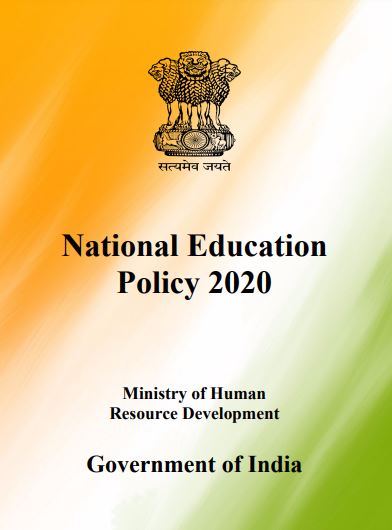‘Summary Of New Education Policy’ PDF Quick download link is given at the bottom of this article. You can see the PDF demo, size of the PDF, page numbers, and direct download Free PDF of ‘New Education Policy’ using the download button.
New Education Policy 2020 PDF Free Download

Introduction
Education is fundamental for achieving full human potential, developing an equitable and just society, and promoting national development.
Providing universal access to quality education is the key to India’s continued ascent, and leadership on the global stage in terms of economic growth, social justice and equality, scientific advancement, national integration, and cultural preservation.
Universal high-quality education is the best way forward for developing and maximizing our country’s rich talents and resources for the good of the individual, the society, the country, and the world.
India will have the highest population of young people in the world over the next decade, and our ability to provide high-quality educational opportunities to them will determine the future of our country.
The global education development agenda reflected in Goal 4 (SDG4) of the 2030 Agenda for Sustainable Development, adopted by India in 2015 – seeks to “ensure inclusive and equitable quality education and promote lifelong learning opportunities for all” by 2030.
Such a lofty goal will require the entire education system to be reconfigured to support and foster learning so that all of the critical targets and goals (SDGs) of the 2030 Agenda for Sustainable Development can be achieved.
The world is undergoing rapid changes in the knowledge landscape.
With various dramatic scientific and technological advances, such as the rise of big data, machine learning, and artificial intelligence, many unskilled jobs worldwide may be taken over by machines, while the need for a skilled workforce, particularly involving mathematics, computer science, and data science, in conjunction with multidisciplinary abilities across the sciences, social sciences, and humanities, will be increasingly in greater demand.
With climate change, increasing pollution, and depleting natural resources, there will be a sizeable shift in how we meet the world’s energy, water, food, and sanitation needs, again resulting in the need for new skilled labour, particularly in biology, chemistry, physics, agriculture, climate science, and social science.
The growing emergence of epidemics and pandemics will also call for collaborative research in infectious disease management and the development of vaccines and the resultant social issues heighten the need for multidisciplinary learning.
There will be a growing demand for humanities and art, as India moves towards becoming a developed country as well as among the three largest economies in the world.
Indeed, with the quickly changing employment landscape and global ecosystem, it is becoming increasingly critical that children not only learn but more importantly learn how to learn.
Education thus, must move towards less content, and more towards learning about how to think critically and solve problems, how to be creative and multidisciplinary, and how to innovate, adapt, and absorb new material in novel and changing fields.
Pedagogy must evolve to make education more experiential, holistic, integrated, inquiry-driven, discovery-oriented, learner-centered, discussion-based, flexible, and, of course, enjoyable.
The curriculum must include basic arts, crafts, humanities, games, sports and fitness, languages, literature, culture, and values, in addition to science and mathematics, to develop all aspects and capabilities of learners; and make education more well-rounded, useful, and fulfilling to the learner.
Education must build character, and enable learners to be ethical, rational, compassionate, and caring, while at the same time preparing them for gainful, fulfilling employment.
The gap between the current state of learning outcomes and what is required must be bridged through undertaking major reforms that bring the highest quality, equity, and integrity into the system, from early childhood care and education to higher education.
The aim must be for India to have an education system by 2040 that is second to none, with equitable access to the highest-quality education for all learners regardless of social or economic background.
This National Education Policy 2020 is the first education policy of the 21st century and aims to address the many growing developmental imperatives of our country.
This Policy proposes the revision and revamping of all aspects of the education structure, including its regulation and governance, to create a new system that is aligned with the aspirational goals of 21st-century education, including SDG4, while building upon India’s traditions and value systems.
The National Education Policy lays particular emphasis on the development of the creative potential of each individual.
It is based on the principle that education must develop not only cognitive capacities both the ‘foundational capacities ’of literacy and numeracy and ‘higher-order’ cognitive capacities, such as critical thinking and problem-solving – but also social, ethical, and emotional capacities and dispositions.
| Author | – |
| Language | English |
| No. of Pages | 66 |
| PDF Size | 8 MB |
| Category | Government |
| Source/Credits | education.gov.in |
Related PDFs
Notary Interview 2023 Maharashtra PDF
New Education Policy 2020 PDF Free Download
